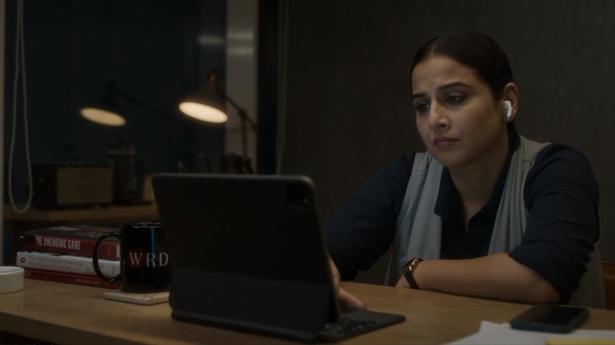
‘Jalsa’ movie review: Vidya Balan, Shefali Shah shine in this tryst with truth
The Hindu
Director Suresh Triveni delivers a casting coup of sorts with the fantastic ensemble of actors, while also charting a relatable and riveting tale on how a self-righteous approach crumbles under circumstances
Since Yash Chopra’s Waqt, the quirk of fate has played an important role in driving the narratives of Hindi cinema. Screenwriters have often tested protagonists who take pride in their honesty. This week it is the turn of Maya Menon (Vidya Balan), a thoroughbred journalist who is presented as the face of truth by her digital channel.
One night, a little indiscretion spirals into an accident that threatens to derail Maya’s career and life.
Her life is her little, specially-abled son Ayush (Surya Kasibatla) who spends more time with the house-maid Rukhsana (Shefali Shah) and his grandmother Rukmini (Rohini Hattangadi) than with her busy and supposedly single mother. Ayush’s father Anand (Manav Kaul) is just a lively filler, perhaps somebody who could not keep up pace with Maya.
On a fateful night, Maya inadvertently drives into the life of Rukhsana. The rest of the story is about Maya hiding her guilt beneath the layers of confidence, assembled over the years in a profession that increasingly hates self-doubts. When Maya gets caught up in the situation, her senior colleague, a friend and well-wisher Amar (Iqbal Khan) tells her it is real life as if the news that they generate 24X7 is not.
On the other side, there is Rukhsana who seeks justice from a system that cajoles her to compromise or else… In a way, Maya and Rukhsana are mirror images as Jalsa is about people who seem to have risen over barriers of class disparity. But when fate puts them in a spot, the fault lines surface all over again. It is also about people who seek a life of dignity but when life tests them, the vulnerabilities of the poor show up.
Director Suresh Triveni, who earlier created the sweet Tumhari Sullu, has placed conflicts in front of his characters but they don’t cry for attention. They are mere coincidences that can happen to anyone, and hence are all the more relatable and mind-numbing. Thankfully, Triveni doesn’t bring religion and gender into play, and keeps it about how the self-righteous approach crumbles under circumstances; what we casually call ‘stress’ these days.
Inside the bigger arch, there is a young intrepid journalist Rohini looking for her first big story and then there is sub-inspector More (Shrikant Yadav) who is on his last case before retirement. How the life of these two intertwine is another compelling little story on how coincidence, sometimes, drives our conscience. Add to it an intense background score and crisp editing, and we have a sleek social thriller that leads to some crude truths. Sometimes, the camera angle conveys a meaning that the dialogue doesn’t. Take the scene where Rukmini, sipping tea at the dining table, tells Rukhsana, sitting on the floor, how they had always considered her family. Here, the camera observes Rukmini from the side of Rukhsana.













